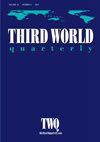A historic review of deforestation and afforestation in North Korea
IF 1.8
2区 经济学
Q2 DEVELOPMENT STUDIES
引用次数: 0
Abstract
Abstract Forest cover loss in the DPRK is intrinsically related to food insecurity and energy insufficiency. This study used qualitative research methods to understand the deforestation and afforestation history of DPRK. Forest cover in the DPRK decreased during the period of Japanese colonisation, increased slightly after liberation, decreased again during the Korean War, increased because of socialist economic progress, and decreased, when Eastern European socialism collapsed after 1990. Between 1990 and 2010, the decrease amounted to 2.2 million ha, while the volume of growing stock continued to decrease by approximately 3% per year. This was due to the copious amounts of fuel wood harvested from forests. Slash-and-burn cultivation of food crops also increased during that time. The decline in forest quantity and quality required comprehensive measures, including favourable international relations, political and institutional reforms, the decentralisation of forest management, and proper technical support for local communities. The forestry issue in DPRK is complex and, therefore, is no longer solely the prerogative of the forestry sector, but is embodied in political, social, cultural, economic, environmental, and other broad development challenges to country faces. Solving the forestry crisis in DPRK requires addressing challenges related to international political engagement and domestic multi-sector coordination and collaboration.朝鲜森林砍伐和植树造林的历史回顾
本文章由计算机程序翻译,如有差异,请以英文原文为准。
求助全文
约1分钟内获得全文
求助全文
来源期刊

Third World Quarterly
DEVELOPMENT STUDIES-
CiteScore
4.10
自引率
15.00%
发文量
137
期刊介绍:
Third World Quarterly ( TWQ ) is the leading journal of scholarship and policy in the field of international studies. For almost four decades it has set the agenda of the global debate on development discourses. As the most influential academic journal covering the emerging worlds, TWQ is at the forefront of analysis and commentary on fundamental issues of global concern. TWQ examines all the issues that affect the many Third Worlds and is not averse to publishing provocative and exploratory articles, especially if they have the merit of opening up emerging areas of research that have not been given sufficient attention. TWQ is a peer-reviewed journal that looks beyond strict "development studies", providing an alternative and over-arching reflective analysis of micro-economic and grassroot efforts of development practitioners and planners. It furnishes expert insight into crucial issues before they impinge upon global media attention. TWQ acts as an almanac linking the academic terrains of the various contemporary area studies - African, Asian, Latin American and Middle Eastern - in an interdisciplinary manner with the publication of informative, innovative and investigative articles. Contributions are rigorously assessed by regional experts.
 求助内容:
求助内容: 应助结果提醒方式:
应助结果提醒方式:


